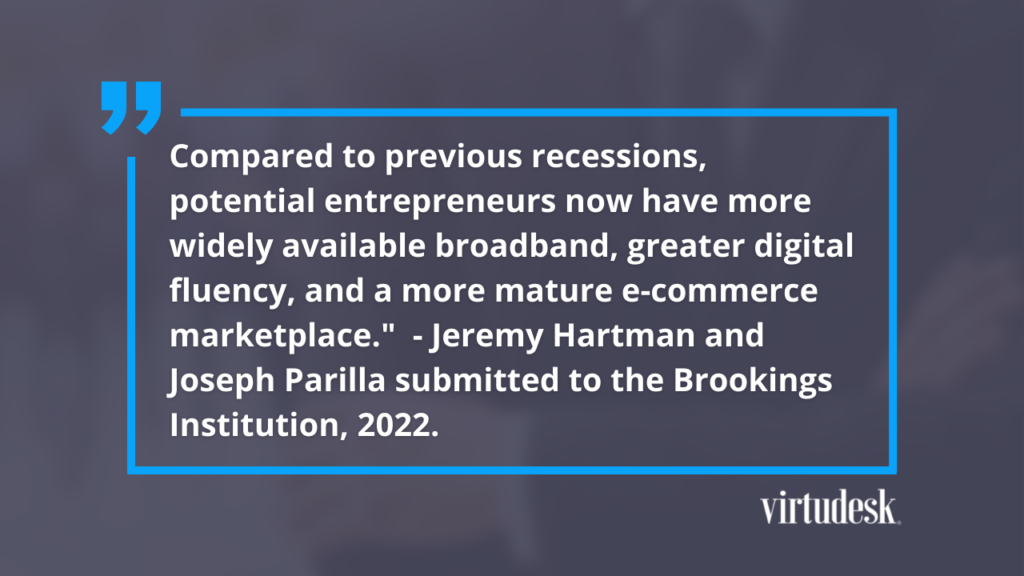How Did The Global Economic Downfall Pave Way To The Rise of Entrepreneurship?
The pandemic caused a global economic downturn. It was brutal for many businesses and industries. It forced many people out of their jobs and into a life of uncertainty. The struggle against COVID-19 pushed governments worldwide to become more indebted.
The capacity to survive was put to the test. Many were left unemployed. Most jobs lost in the crisis were in industries with low average salaries.
There were shutdowns, travel bans, and other movement restrictions. All these crippled the economy. The pandemic destroyed half of the global workforce. World Bank also confirmed the worst recession since World War II.
This article will discuss the unprecedented effects of the economic downturn. It will focus mainly on the entrepreneurship sector. What are the implications and opportunities it created? We will examine whether it influenced how we do things today.
The Pre-COVID State of Entrepreneurship
Before the pandemic, entrepreneurship was already on the rise. It was after a 40-year decline in the United States. It remained in an upward trend with a slight decrease over the past few years. From 1996-2019, the average of new businesses created was 0.31% of the adult population.
Globally, entrepreneurial activity before the pandemic was up. This is true in high-income group countries. What could be the impact of this pandemic?
Skeptics saw the event as a collapsing factor in many economies. Was it?
Two Significant Years (2020-2021)
The year 2020 was a significant year for entrepreneurship for several reasons. The COVID-19 pandemic led to a worldwide economic downturn. The shutdowns in most cities were inevitable.
Businesses closed doors, and some even went bankrupt. Lockdowns and movement restrictions caused these to happen. To start a business in this troubled year needed a lot of courage and determination.
The race to make a vaccine against COVID-19 has been a great success globally. Many economies reopened. It led to the creation of even more opportunities for entrepreneurs.
The year 2021 was a significant period for entrepreneurship as well. The distribution of vaccines started. The US administration unveiled more policies and programs to support small businesses.
Help included the following:
- Paycheck Protection Program (PPP)
- Economic Injury Disaster Loans (EIDL)
- SBA Debt Relief
- Shuttered Venue Operators Grant
Overall, something unexpected emerged between these years. The Global Entrepreneurship Monitor (GEM) revealed entrepreneurial activity rate increased. Data shows it accelerated from 11.2% in 2019 to 12.4% in 2020.
This represents an increase of nearly 1.3 million people who started a business in 2020 compared to 2019. In 2021, the GEM report found that the global early-stage entrepreneurial activity rate increased to 13.1%.
These data suggest that the pandemic has failed to stop the rise in entrepreneurship. It has accelerated it. So, how did the global economic downfall pave the way for the rise of entrepreneurship?
4 Factors Driving the Rise of Entrepreneurship
1. Pandemic-Induced Shifts in the Workforce
Other shifts in our culture and economy have resulted in the trends we see now. The COVID-19 pandemic has led to a global economic decline. It resulted in layoffs and job losses across many businesses and industries. This alone has created opportunities for people who thought they had lost everything.
- Significant Layoffs and The Great Resignation. In 2020, some of the world's largest companies announced mass layoffs. For example, IBM announced that it laid off thousands of employees, while Goldman Sachs reduced its workforce by 10%. These layoffs ripple effect on the global economy. Many of these workers sought new opportunities.
The pandemic also resulted in the so-called "Great Resignation." This is when employees leave their jobs voluntarily in search of new opportunities.
In 2020, there was a significant increase in resignations compared to previous years. In another report, LinkedIn's data showed that resignations were up 30% in the US in 2020.
- Changing Work Sentiments. The COVID-19 pandemic has changed the way people feel about work. A study by Gallup found that 36% of workers in the US would like to leave their jobs when the pandemic is over. This is up from 30% before the pandemic.
Additionally, 41% of workers said they would like to work fewer hours. Some 30% said they would like to work from home more.
These changing sentiments led many people to start businesses at home. They wanted to fulfill their emotional obligations to family. They felt that working at home brought them closer to their loved ones. And it helped them cope with the pandemic's challenges. This led to the rise in entrepreneurship in the USA and worldwide.
- Changing Consumer Demand. The COVID-19 pandemic also altered consumer demand. People spend less on non-essential items and services. This created opportunities for entrepreneurs to start businesses.
There has been an increase in demand for delivery and takeaway services as people avoided going out to eat. Additionally, there has been a surge in demand for home-based businesses. This surge includes online fitness and education classes.
2. Online Opportunities Brought by Developments in Technology
The COVID-19 pandemic has accelerated the adoption of many technologies. These are 5G, artificial intelligence (AI), and the internet of things (IoT).
5G is expected to create opportunities in many areas in intelligent cities. Additionally, AI is expected to create opportunities in predictive analytics and chatbots.
Add to it the fact that most sellers moved their stores online. People who can access their products can place orders with a click on their gadgets.
These opportunities boosted the entrepreneurial side of people. People are looking for a chance to maximize their financial assets. They are searching for ways to generate income for their families.
3. Unprecedented Need For Public Health And Biotech Innovations
The pandemic has created an unprecedented need for public health and biotech innovations. While a pandemic like COVID-19 is an anticipated event, only a few take it seriously.
Many neglected aspects connected to preventive health measures have been awakened. This has resulted in a surge in investment in these sectors. With this in mind, venture capital firm Andreessen Horowitz has raised $2.5 billion for its Biotech Fund. It is the most prominent VC fundraised for the industry.
The Bill & Melinda Gates Foundation has also committed $1.7 billion to fight COVID-19.
Entrepreneurs used this opportunity to profiteer. The demand for face masks, alcohol, and sanitizers grew. Also, temperature scanners and other pandemic-related products helped many to start their businesses.
4. Unconquered Markets
Many entrepreneurs started businesses in unconquered markets. Consider the demand for online fitness and education classes. People avoided going to gyms and schools during the pandemic's peak.
Additionally, there was a demand for delivery and takeaway services. Even before the dawn of the post-pandemic period, these services and markets remained a trend for many.
How Did The Economic Downfall Turn Into a New Opportunity?
The global economic downfall led to the rise of entrepreneurship in many ways. It created a ripe environment for entrepreneurship. People are expected to start many new businesses they deem appropriate at a given time.
1. Creation of New Businesses and Jobs
The economic downturn created many opportunities for entrepreneurs to start and create jobs. This opportunity created new businesses and jobs in public health and biotech.
Data shows that in the last three months of 2020, 1.4 million new businesses registered with the US government. It is a 21% increase from the previous quarter. This shows that many people are taking advantage of the economic downturn's opportunities.
Although many resigned from their jobs, most are seeking new opportunities where there is a greener pasture. They wanted a less stressful working environment than they had in the past.
2. Innovation and Growth
At the dawn of the post-pandemic period, we are now seeing a surge in businesses focusing on innovation and growth. The IT sector proved to be resilient on this matter. Newly started businesses created opportunities for online workers to get these work changes.
People with skills in writing, technology, and photo manipulation survived. Video editors, web designers, developers, software makers, and app developers excelled. Other innovative products and services gained the highest popularity even after the pandemic. Virtual assistants who were already experienced remote workers benefited much from these changes.
These services offered are considered individual businesses. Frankly, because of innovation and growth, businesses with an online nature were not severely affected by the pandemic. It adapted to change and is ready to evolve if necessary.
The eCommerce industry is booming with more online businesses than ever. People shop through their mobile phones rather than in person.
While the world is crumbling around them, entrepreneurs strive for their economic resiliency. They are quick to adapt and change with the times. This has led to many successful businesses during economic downturns.
But, how about in their transition to the new normal? How can they keep their businesses alive?
New Business Developments to Help You in the New Normal
In the new normal, new application data manifest that US entrepreneurship has returned to where it has been. While the global economic downturn played a vital role in the rise of entrepreneurship, it is not always absolute.
Every day things must go back with some tweaks or even a newer climate. To keep pace with how the business world operates today, you must keep in mind these three developments.
Digitization
Today, businesses need digitization. Your business should have an online presence to cater to the online consumer. Additionally, your business processes should be streamlined and efficient.
SaaS (Software as a Service) companies offer their products and services online. These companies have seen a significant increase in demand as businesses move online.
"Compared to previous recessions, potential entrepreneurs now have more available broadband. They also have greater digital fluency and a more mature e-commerce marketplace." - Jeremy Hartman and Joseph Parilla said to the Brookings Institution.

Outsourcing
Outsourcing is a business strategy that has been around for many years. But, it has become popular in recent years as it can help businesses save costs. In the current business climate, outsourcing has become even more attractive. More businesses seek to cut costs and focus on their core competencies.
In the new normal, hiring a virtual assistant from Virtudesk is preferred. It would be more flexible and cost-effective for your business. With a virtual assistant, you can get all the help you need. You don't have to worry about the associated costs.
Diversification
Diversification is a business strategy that involves expanding your business. It means diving into new markets or product categories. It can help your business mitigate risks and capitalize on new opportunities. The COVID-19 pandemic has created many new market opportunities for businesses to pursue.
The rise in e-commerce has created new opportunities. Businesses sell their products and services online during the pandemic. And it continues to be a trend.

How Can Businesses Thrive After The Pandemic?
The COVID-19 pandemic has changed the way we live and work. As we enter the post-pandemic world, businesses must adapt to these changes. Change is good. It opens new opportunities for businesses to grow and prosper.
There are three ways businesses can thrive after the pandemic. These include investing in digital transformation, focusing on customer experience, and embracing change. After all, it is an evolving process that will take some time to get used to.
The global economic downturn proved how resilient entrepreneurs could be. It is a testament to their fortitude. They adapt and change with the times, which has led to many successful businesses. Instead of succumbing to the global economic downturn, entrepreneurs rose to the challenge.
Thus, the global economic downturn has paved the way for the rise of entrepreneurship. It did in more ways than one. If you’re interested in learning more, fill out this form, and one of our Consultants will get in touch with you.
More Articles from Virtudesk:
Share this article
Meet our Most Trusted
Partners & Clients

Byron Lazine
Co-Founding Chief-of-Operations at BAM (Broke Agent Media)I’ve been using Virtual Assistants for years throughout all of my companies. Once we found Virtudesk the process got even easier and allowed us to scale out our hiring. Highly skilled and accountable professionals. 100% recommend!

Rebecca Julianna James
Realtor / Content CreatorBefore getting started with Virtudesk I had my doubts that they would find what I was looking for. I needed a very particular person to add to my team and let me tell you I am highly pleased! My virtual assistant Myril is the best! I am excited to grow my socialmedia accounts with her. Thank you Virtudesk!

Chelsea Erickson
Realtor La Belle RE GroupI am very happy with the assistance Virtudesk is providing for my real estate business. This is a newer position for my company and we are working through the creation and efficiency.















